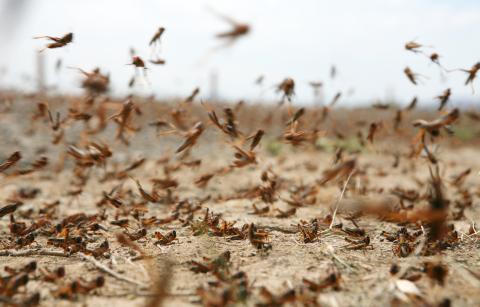
Invasive alien species: an underestimated global threat
Invasive alien species constitute a serious and costly threat worldwide for nature and people. Such is the alarming conclusion made in the latest report, “Assessment Report on Invasive Alien Species and their Control”, published by the Intergovernmental Science-Policy Platform on Biodiversity and Ecosystem Services (IPBES). Franck Courchamp, a Research Director at the Laboratory for Ecology, Systems and Evolution (ESE - CNRS/Univ. Paris-Saclay, AgroParisTech), was one of the report’s authors.
The report is the most comprehensive assessment to date on invasive alien species worldwide. Since 2019, 86 experts from 49 different countries have analysed 13,000 references, including major contributions from indigenous peoples and local communities. Approved by representatives of the 143 member states of IPBES, the report finds that invasive alien species play a key role in 60% of global species extinctions (plants and animals) and that the annual cost of the damage caused directly and indirectly by alien species exceeds $423 billion.
IPBES experts have identified over 37,000 alien species which have been introduced in the last few decades by human activity around the world. While not all alien species are invasive and manage to integrate their natural environment without altering it, 3,500 alien species are considered harmful, posing a key threat worldwide to nature, the economy, food security and human health.
The types of damage caused by invasive alien species are varied, ranging from having a harmful impact on the food resources of local populations to negatively affecting quality of life and health. This is the case for diseases such as malaria, Zika and West Nile Fever, spread by invasive alien mosquito species like Aedes albopictus and Aedes aegyptii.
IPBES experts emphasise that the measures in place to tackle these challenges are generally insufficient. While 80% of countries have targets related to managing invasive alien species in their national biodiversity plans, only 17% have national laws or regulations specifically addressing these issues. This also increases the risk of invasive alien species for neighbouring States. The report finds that 45% of all countries do not invest in the management of biological invasions.
On a more positive note, the report highlights that future biological invasions, invasive alien species, and their impacts, can be prevented through effective management and more integrated approaches.
Contact: Franck Courchamp – the Laboratory for Ecology, Systems and Evolution (ESE - CNRS/Univ. Paris-Saclay, AgroParisTech) – franck.courchamp@universite-paris-saclay.fr
More information: IPBES website
